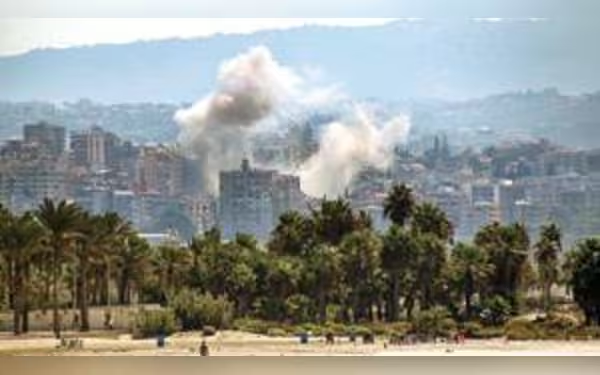Saturday, November 16, 2024 05:41 PM
Biden Warns of Possible All-Out War in Middle East
- Biden highlights potential for all-out war in the Middle East.
- Israeli military prepares for ground incursion into Lebanon.
- Over 51 casualties reported due to Israeli strikes in Lebanon.
 Image Credits: nation_pk
Image Credits: nation_pkPresident Biden warns of potential all-out war in the Middle East amid rising tensions between Israel and Hezbollah.
The ongoing conflict in the Middle East has reached a critical juncture, with rising tensions between Israel and Hezbollah. Recently, U.S. President Joe Biden expressed that an "all-out war" is a possibility in the region. However, he also emphasized that there remains a chance to de-escalate the situation and work towards a peaceful resolution. This statement was made during an appearance on the ABC daytime talk show "The View," where Biden highlighted the importance of pursuing a two-state solution to address the long-standing issues in the area.
As the situation intensifies, the Israeli military is reportedly preparing for a potential ground incursion into Lebanon. Lt. Gen. Herzi Halevi, the Chief of the General Staff, informed troops that military operations are ongoing, with airstrikes being conducted throughout the day. He stated, "You hear the jets overhead; we have been striking all day." This preparation comes in light of the increasing hostilities and the need to counter Hezbollah's military capabilities.
In a concerning development, at least 51 individuals have lost their lives due to Israeli strikes in Lebanon, according to the Lebanese Minister of Health. Dr. Firass Abyad reported that many people have been displaced, including vulnerable hospital patients. The humanitarian impact of the conflict is significant, with the government pledging to provide essential supplies such as medicine and infant formula to those affected.
President Biden reiterated the necessity of finding a diplomatic solution, stating that there is still a pathway to achieving a ceasefire. He mentioned that if a ceasefire can be established in Lebanon, it could pave the way for addressing issues in the West Bank and Gaza. This perspective highlights the interconnected nature of the conflicts in the region and the importance of a comprehensive approach to peace.
As the world watches these developments unfold, the potential for escalation remains a pressing concern. The international community is urged to engage in diplomatic efforts to prevent further violence and to support humanitarian initiatives for those affected by the conflict. The hope is that through dialogue and cooperation, a lasting peace can be achieved, allowing the people of the region to live without the fear of war.













